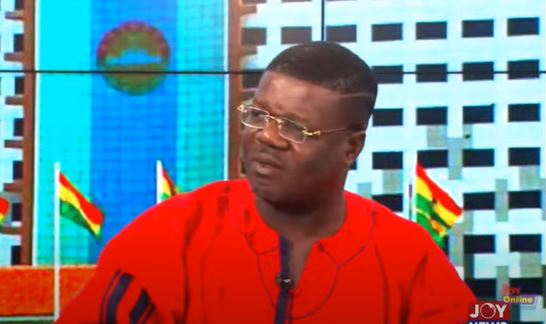The Member of Parliament for South Dayi, Rockson-Nelson Dafeamekpor, says Minority Chief Whip, Muntaka Mubarak, is in the wrong for faulting the Speaker of Parliament's referral of three MPs to the Privileges Committee.
According to Mr. Dafeamekpor, Speaker Alban Bagbin did not breach the Standing Orders when he referred Dome-Kwabenya MP, Sarah Adwoa Safo, Ayawaso Central MP, Henry Quartey; and Assin Central MP, Ken Ohene Agyapong, to the Privileges Committee.
“I disagree with the Honourable Minority Chief Whip on his opposition to the Speaker's directive. He thinks Speaker hasn't got the power to refer the matter to the Privileges Committee using the statement by the Speaker. But it is part of the procedure,” he said.
Speaking on JoyNews’ AM Show, he noted that Mr. Mubarak Muntaka is fixated on Order 76 (1) of the Standing Orders.
Standing Order 76 (1) states, "every adjudication to Parliament and every petition must be presented by a member who shall be responsible for the observance of the rules contained in appendix A."
Interacting with host, Benjamin Akakpo, the South Dayi MP explained that “Order 76 is not the only way a matter can be referred to any committee of Parliament by word of petition.”
He said Mr. Bagbin acted on formal communication to the Speaker in Order 53 (1) (e) and not a petition he received. Mr. Dafeamekpor in his submission, also cited Order 164 to buttress his point.
Mr. Dafeamekpor argued that Order 164 states that, "there shall be a committee of privileges which shall consist of the First Deputy Speaker as Chairman and not more than 30 other members. It shall be the duty of the committee by order of the House to enquire into any complaint of contempt of Parliament or breach of privilege or any matter which may be referred to it and to recommend to the House such action the Committee may consider appropriate.”
“Speaker is saying by his formal communication to the House, a breach of privilege has occurred. So, Speaker is sound in approach,” the South Dayi MP added.
On Tuesday, Speaker of Parliament, Alban Bagbin, after referring the three MPs to the Privileges Committee for breaching the 15-day rule, called on the Committee to submit their report to the plenary two weeks after the resumption of the second meeting.
The Speaker’s ruling was however challenged by Minority Chief Whip, Muntaka Mubarak.
The Asawase MP argued that the Speaker is not clothed with the powers to independently refer the conduct of the MPs to the Privileges Committee.
“Mr. Speaker, with the greatest of respect, we agree you made a statement, but your conclusion (we do not). The danger with this is that it allows speakers to take petitions from outsiders to refer Members of Parliament to Privileges Committee.
“Colleagues, we will be doing ourselves the greatest disservice, because we will one day get a dictator Speaker who will simply take statements from outsiders and begin to penalise individual Members of Parliament.
“It is on this basis, I call on all of us to resist the attempt by Mr. Speaker to refer our colleagues to the Privileges Committee. If there is justification, let us get one of us as Member of Parliament who is convinced that our colleagues need to go to Privileges Committee,” he said.
According to the Speaker, he did not err, as the petition he received was to the Speaker and not directed to Parliament.
“There is a vast difference between a petition to the Parliament and a petition to the Speaker. I have not taken away petitions to Parliament. When I read the subject matter of the petitions and I see that the petition is to Parliament, usually, I refer the petitioner to the constitutional provisions and our standing orders, and the Clerk's office will bear me out, that advice is written to the petitioners to route the petition through a Member of Parliament.
“That doesn’t prevent the public or any person from writing a petition to a Speaker. That is different from a petition to Parliament. What I referred to was a petition to the Speaker, calling on me as Speaker to perform my constitutional duty,” he said.
Latest Stories
-
We’ll embrace cutting-edge technologies to address emerging healthcare needs – Prof. Antwi-Kusi
9 minutes -
13 minutes -
Environmental protection officers receive training on how to tackle climate change
16 minutes -
CLOGSAG vows to resist partisan appointments in Civil, Local Government Service
1 hour -
Peasant Farmers Association welcomes Mahama’s move to rename Agric Ministry
1 hour -
NDC grateful to chiefs, people of Bono Region -Asiedu Nketia
2 hours -
Ban on smoking in public: FDA engages food service establishments on compliance
2 hours -
Mahama’s administration to consider opening Ghana’s Mission in Budapest
2 hours -
GEPA commits to building robust systems that empower MSMEs
2 hours -
Twifo Atti-Morkwa poultry farmers in distress due to high cost of feed
2 hours -
Central Region PURC assures residents of constant water, power supply during yuletide
2 hours -
Election victory not licence to misbehave – Police to youth
2 hours -
GPL 2024/2025: Nations thrash struggling Legon Cities
2 hours -
Electoral offences have no expiry date, accountability is inevitable – Fifi Kwetey
2 hours -
Ghanaians to enjoy reliable electricity this Christmas – ECG promises
2 hours

